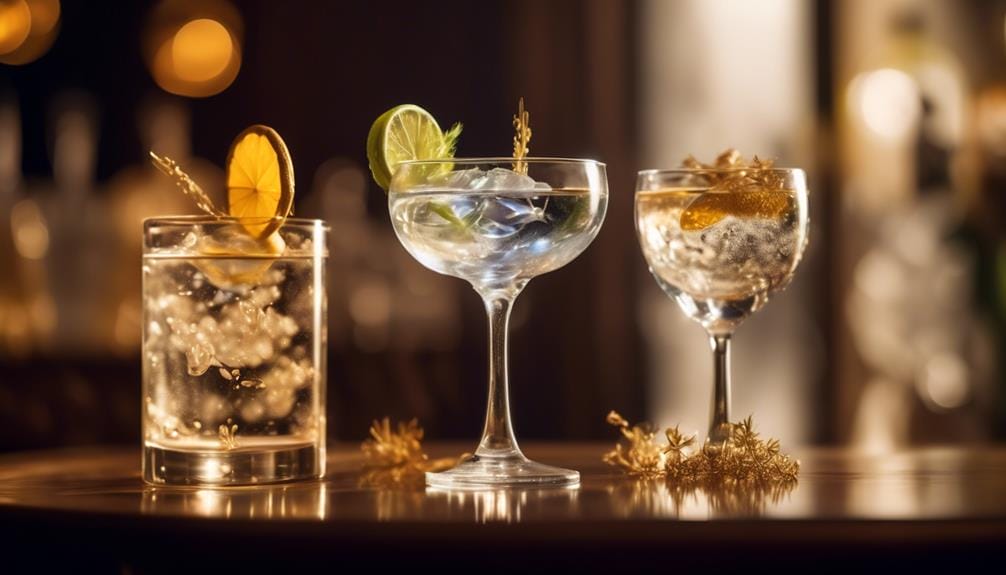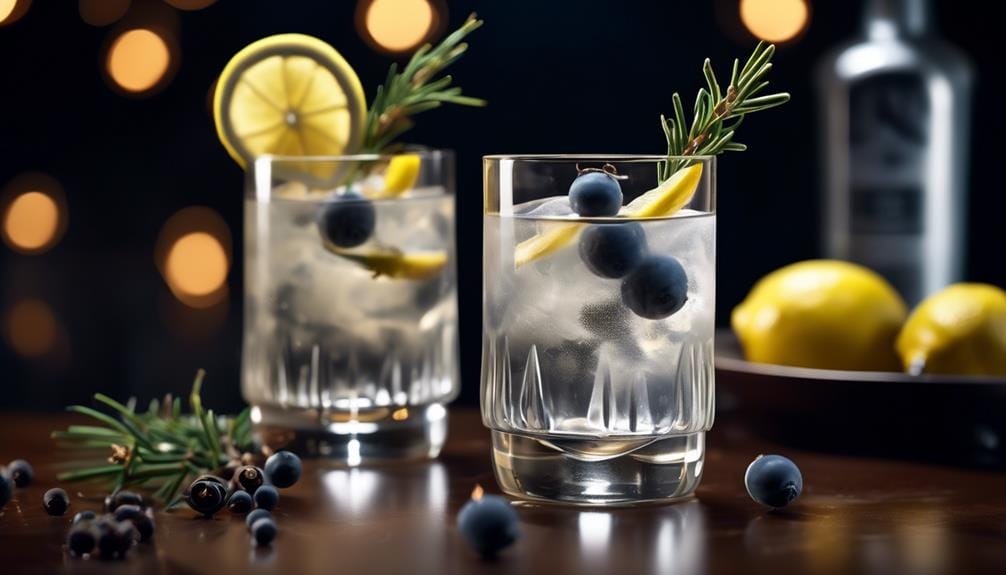You may argue that comparing gin and vodka is like comparing apples and oranges, as they have distinct flavours and origins. However, when it comes to choosing a spirit for your next cocktail, the decision between gin and vodka can be a crucial one.
So, let’s dive into the world of these clear spirits and explore their origins, production methods, flavor profiles, and popular cocktails. By the end, you’ll have a better understanding of which spirit reigns supreme in the battle of gin versus vodka.
But before we unveil the final verdict, let’s explore the fascinating history and characteristics of these two beloved spirits.
Key Takeaways
- Gin originated from Dutch genever and gained popularity in England during the 1600s, while vodka originated in Russia and Poland in the 1400s.
- Gin is made from a neutral spirit infused with juniper berries and other botanicals, while vodka can be made from various ingredients such as potatoes, cereal grains, or grapes.
- Gin has a distinct juniper flavour and is defined by its signature pine taste, while vodka is known for its clear and flavourless profile.
- Vodka is a versatile drink that can be mixed with various ingredients to create a multitude of cocktails, while gin adds a touch of sophistication with its distinct juniper flavour and complex botanical notes.
Origins and History of Gin and Vodka
Gin and vodka have fascinating origins and historical backgrounds that trace back to different countries and time periods.
Gin originated from Dutch genever and gained popularity in England during the 1600s. It was derived from Dutch genever and was initially used for medicinal purposes. The word ‘gin’ is believed to come from the Dutch word ‘jenever,’ which means juniper, a key ingredient in gin.
Vodka, on the other hand, originated in Russia and Poland in the 1400s. The word ‘vodka’ comes from the Russian word for water, voda.
Both spirits are made through a process of distillation, but they’ve different base ingredients. Gin is made from a neutral spirit, commonly called London Dry gins, and infused with juniper berries and other botanicals to give it a distinct flavour. Vodka, on the other hand, is made from a neutral spirit and is known for its clear and flavourless nature.
The origins and historical backgrounds of gin and vodka contribute to their unique characteristics, making them popular choices for those seeking a refreshing alcoholic beverage.
Production Methods and Ingredients
When it comes to the production methods and ingredients of gin and vodka, there are distinct differences that contribute to their unique characteristics and flavours.
- Vodka can be made from various ingredients such as potatoes, cereal grains, or even grapes. This variety in base spirit allows for different flavour profiles and textures, giving vodka its neutral taste. On the other hand, gin must contain juniper as its main botanical ingredient. This gives gin its iconic pine and herbal flavours that are loved by cocktail enthusiasts.
- Vodka is known for its high alcohol content, usually around 40% ABV (alcohol by volume). This makes it a popular choice for those looking for a strong drink. Gin, on the other hand, also has a high alcohol content but its distinctive flavours and aromas make it a favourite in the cocktail culture.
Vodka’s production methods prioritise quality, often being distilled twice and bottled once. This ensures a smooth and clean finish. Gin, on the other hand, requires more intricate production methods. It can be produced through distillation, redistillation, or compounding, allowing for a wide range of flavour profiles.
Flavour Profiles and Characteristics

One important aspect to consider when comparing gin and vodka is their distinctive flavour profiles and characteristics. The main difference lies in the taste. While gin has a distinct juniper flavour, vodka is known for its clear and flavourless profile. Gins must contain juniper berries, which give it a signature pine flavour. On the other hand, vodka is defined as a neutral spirit without distinctive character, taste, or colour. The flavour of gin reflects the presence of juniper berries, while vodka’s taste is relatively bland, reflecting its high alcohol content.
Another key difference is how these two spirits are served. Vodka is typically enjoyed ice cold and is perfect for a night on the town. It pairs well with sweet mixers like cranberry, cola, and other soft drinks. Gin, on the other hand, can be enjoyed chilled or at room temperature. It’s often seen as a classy drink with a delicate taste and surprising complexity. The classic mixer for gin is tonic, which complements the taste of juniper berries perfectly.
Popular Cocktails and Recipes
Popular cocktails and recipes offer a variety of options for enjoying both gin and vodka. These two spirits, although often used interchangeably, have their own distinct differences that make them unique in their own right. When it comes to popular drinks, both vodka and gin have their fair share of classic cocktails that showcase their individual characteristics. Here are a few examples:
- Classic Vodka Cocktails: Vodka cranberry and the Bloody Mary are two popular drinks that highlight the versatility of vodka. Vodka cranberry combines the crisp and clean taste of vodka with the sweet and tangy flavours of cranberry juice, creating a refreshing and easy-to-drink cocktail. On the other hand, the Bloody Mary is a savoury cocktail made with vodka, tomato juice, and a blend of spices, providing a bold and robust flavour profile.
- Gin and Tonic: A classic cocktail that can be made using either vodka or gin, the gin and tonic is a refreshing and timeless drink. However, using gin in this cocktail allows for the taste of juniper berries to shine through, adding a unique botanical twist to the drink. The combination of gin’s herbal and citrus notes with the bitterness of tonic water creates a balanced and sophisticated cocktail.
These popular cocktails demonstrate the versatility and distinct characteristics of both vodka and gin, giving you a wide range of options to choose from when it comes to enjoying these spirits. Whether you prefer the clean and neutral flavours of vodka or the botanical and aromatic qualities of gin, there’s a cocktail out there for everyone to savour.
Final Verdict: Which Spirit Is the Winner?

After considering the distinctive flavours and characteristics of gin and vodka, it’s time to determine which spirit takes the crown. Both vodka and gin have their own unique qualities that make them popular choices in different contexts.
Vodka, with its clear and flavourless profile, is a versatile drink that can be mixed with various ingredients to create a multitude of cocktails. It’s known for its smoothness and ability to blend well with other flavours, making it a popular choice for classic drinks like the Martini or Bloody Mary.
On the other hand, gin stands out with its distinct juniper flavour and complex botanical notes. It’s a classy drink that adds a touch of sophistication to cocktails like the Negroni or the classic Gin and Tonic.
While vodka may be the winner in terms of versatility, gin wins in terms of flavour complexity and uniqueness. Ultimately, the choice between vodka and gin depends on personal preference and the specific cocktail being made. So, in the final verdict of this article’s section, both spirits can be considered winners in their own right, depending on the context and the drinker’s taste.
Frequently Asked Questions
Which Is Better Gin or Vodka?
When it comes to flavour profiles, mixability options, distillation process, historical origins, cocktail culture, health benefits, global popularity, distinctive botanicals, and production techniques, it ultimately depends on your drinking preferences.
Is Gin Just Fancy Vodka?
Gin and vodka have different flavour profiles and historical origins. Gin is not just fancy vodka; it has its own unique distillation process, botanicals, popular brands, and food pairings. Try gin cocktails and explore unique vodka recipes.
Is Gin or Vodka Better for Hangovers?
To prevent hangovers, it’s important to consider alcohol tolerance, hydration, and moderation. Both gin and vodka can contribute to hangovers, so choose mixers wisely and drink responsibly.
Is Gin or Vodka Better for Your Stomach?
Gin and vodka have different impacts on your stomach. They can affect gut bacteria, stomach acidity, alcohol absorption, and potential for irritation. They may also influence digestion, inflammation, nutrient absorption, stomach ulcers, and overall gastric health.
Conclusion
In conclusion, both gin and vodka have their own unique characteristics and flavours. While vodka is known for its neutral taste, gin stands out with its prominent juniper flavour. The choice between the two ultimately comes down to personal preference and the intended use.
Whether you prefer a classic Martini or a refreshing Gin and Tonic, both spirits have their place in the world of cocktails. So, the winner really depends on your own taste buds and the occasion.
